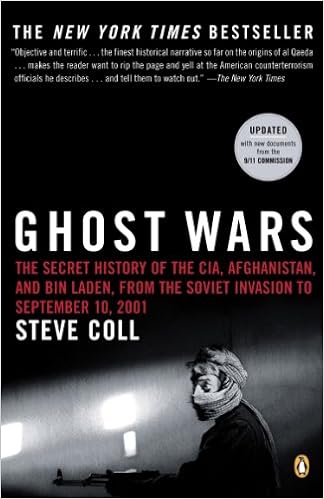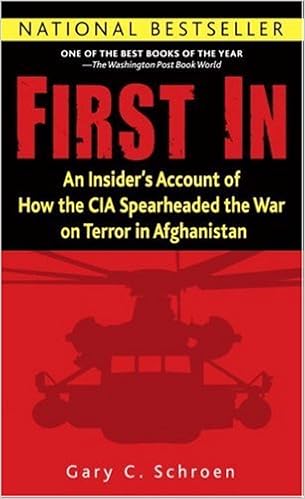The second is First In, by Gary Schroen, a longtime CIA operator in Afghanistan and Pakistan, a not insignificant character of Ghost Wars, and also the leader of the first CIA team to enter Afghanistan and link up with the Northern Alliance after 9/11.
Just started First In after finishing Ghost Wars, so not much to say about it yet.
As for Ghost Wars, it is a first-rate history. It's a frustrating read, obviously, knowing how it ends. As far as the US government's role in dealing with al Qaeda pre-9/11, it's a litany of human error, bureaucratic intransigence and infighting, risk aversion and missed opportunities, all the way through both the Clinton and early Bush administrations. We were stymied, too, by how to manage Pakistan. Pakistan played with fire -- and maybe they still do -- effectively creating the Taliban and encouraging Afghanistan's foreign jihadi camps with an eye to sending the graduates to spread mayhem in Kashmir. What could possibly go wrong? What indeed? It was the same game the CIA played in unleashing the mujahedin against the Soviets. The blowback, when it came, well...
As I read it, I was reminded of a paradox inherent in the sci-fi notion of going back in time and killing Hitler: if you did that? If you were able to go back and kill Hitler in 1930? Nobody would ever know why. He was a nobody! Why did you go and do that? Decades later, nobody would know why Hitler needed killing, so how would you ever even have the idea to do so in the first place?
My point is, the same sort of applied to bin Laden. This analogy to an alternative history is even touched on briefly in Ghost Wars:
[Counter-terrorism "czar" Richard] Clarke compared his crusade to Winston Churchill's lonely, isolated campaign during the 1930s to call attention to rising Nazi power before it was too late. If Churchill had prevailed when he first called for action, Clarke said, he would have gone down in history "as a hawk, as someone who exaggerated the threat, who saber-rattled and did needless things." Increasingly, this was the charge Clarke himself faced. (p. 390 of paperback edition)Up to September 10, 2001, bin Laden was known as a dangerous terrorist, but how dangerous? Until we saw his evil vision fully realized, it was very difficult to muster the political will to take any truly audacious action to capture or kill him. Clinton was weakened by impeachment, a doubly lame duck. Bush was just finding his feet. Maybe history just had to take the course it took. Bummer of a thought.


Have you read The Looming Tower by Lawrence Wright? Highly recommended. I *haven't read* Ghost Wars, but your summary suggests that Wright offers a slightly different narrative about OBL and Afghanistan.
ReplyDeleteNo sir I haven't. Sounds like a good companion piece. Ghost Wars is tightly focused on the CIA with just a few brief tangents into broader or related history.
ReplyDeleteI have some other CIA/SF books about Afghanistan that you should check out. But don't take my wotd for it...
ReplyDelete